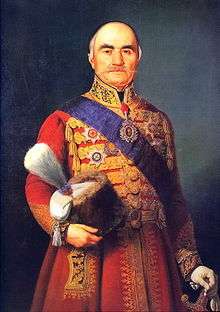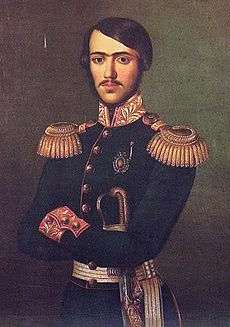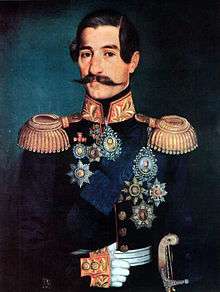Principality of Serbia
| Principality of Serbia | ||||||||||||
| Кнежевина Србија Kneževina Srbija | ||||||||||||
| ||||||||||||
| ||||||||||||
 Principality of Serbia in 1878 | ||||||||||||
| Capital | Belgrade Kragujevac (1818–38) Gornja Crnuća (1815–18) | |||||||||||
| Government | Principality | |||||||||||
| Prince | ||||||||||||
| • | 1817–39 | Miloš Obrenović I (first) | ||||||||||
| • | 1868–82 | Milan Obrenović IV (last) | ||||||||||
| Prime Minister | ||||||||||||
| • | 1815–16 | Petar Nikolajević Moler (first) | ||||||||||
| • | 1880–82 | Milan Piroćanac (last) | ||||||||||
| History | ||||||||||||
| • | Recognition by the Sublime Porte | 1815 | ||||||||||
| • | Statehood Day | February 15, 1835 | ||||||||||
| • | de facto independence | 1867 | ||||||||||
| • | de jure Ottoman recognition | July 13, 1878 | ||||||||||
| • | Proclaimed Kingdom | 1882 | ||||||||||
| ||||||||||||
The Principality of Serbia (Serbian: Кнежевина Србија / Kneževina Srbija) was a semi-independent state in the Balkans that came into existence as a result of the Serbian Revolution which lasted between 1804 and 1817. Its creation was negotiated first through an unwritten agreement between Miloš Obrenović, leader of the Second Serbian Uprising and Ottoman official Marashli Pasha. It was followed by the series of legal documents published by the Porte in 1828, 1829 and finally, 1830 — the Hatt-i Sharif. Its de facto independence ensued in 1867, following the expulsion of all Ottoman troops from the country; Treaty of Berlin (1878) recognized its independence internationally. By 1882 the country was elevated to Kingdom of Serbia.
History
The Serbian revolutionary leaders — first Karađorđe and then Miloš Obrenović — succeeded in their goal of liberating Serbia from centuries-long Turkish rule. Turkish authorities acknowledged the state in 1830 by the charter known as the Hatt-i Sharif, and Miloš Obrenović became a hereditary prince (knjaz) of the Serbian Principality.
At first, the principality included only the territory of the former Pashaluk of Belgrade, but in 1831–33 it expanded to the east, south, and west. In 1866 Serbia began campaign of forging The First Balkan Alliance by signing the series of agreements with other Balkan entities in period 1866-68. On 18 April 1867 the Ottoman government ordered the Ottoman garrison, which had been since 1826 the last representation of Ottoman suzerainty in Serbia, withdrawn from the Belgrade fortress. The only stipulation was that the Ottoman flag continue to fly over the fortress alongside the Serbian one. Serbia's de facto independence dates from this event.[1] A new constitution in 1869 defined Serbia as an independent state. Serbia was further expanded to the southeast in 1878, when its independence from the Ottoman Empire won full international recognition at the Treaty of Berlin. The Principality would last until 1882 when it was raised to the level of the Kingdom of Serbia.
Political history
Autonomy
- Akkerman Convention (7 October 1826), treaty between the Russian Empire and Ottoman Empire, had article 5 on Serbia: autonomy, and return of lands removed in 1813, Serbs were also granted freedom of movement through the Ottoman Empire. Rejected by Mahmud II in 1828.
- 1829 Hatišerif
- 1830 Hatišerif
- 1833 Hatišerif
Rulers
The Principality was ruled by the Obrenović dynasty, except for a period under Prince Aleksandar of the Karađorđević dynasty. Princes Miloš and Mihailo Obrenović each reigned twice.
| Portrait | Name | Birth | Death | From | Until | Notes | |
|---|---|---|---|---|---|---|---|
 |
Miloš Obrenović I | March 17, 1780 | September 26, 1860 | November 6, 1817 | June 25, 1839 | ||
 |
Milan Obrenović II | October 21, 1819 | July 8, 1839 | June 25, 1839 | July 8, 1839 | ||
 |
Mihailo Obrenović III | September 16, 1823 | June 10, 1868 | July 8, 1839 | September 14, 1842 | ||
 |
Aleksandar Karađorđević | October 11. 1806 | May 3. 1885 | September 14, 1842 | December 23, 1858 | ||
 |
Miloš Obrenović I | March 17, 1780 | September 1860 | December 23, 1858 | September 26, 1860 | ||
 |
Mihailo Obrenović III | September 16, 1823 | June 10, 1868 | September 26, 1860 | June 10, 1868 | ||
 |
Milan Obrenović IV | August 22, 1854 | February 11, 1901 | June 10, 1868 | March 6, 1882 | ||
Gallery
 Principality of Serbia in 1817
Principality of Serbia in 1817 Principality of Serbia in 1833
Principality of Serbia in 1833 Principality of Serbia from 1833-1878
Principality of Serbia from 1833-1878
See also
References
- ↑ Stanford J. Shaw and Ezel Kural Shaw, History of the Ottoman Empire and Modern Turkey, Volume 2: Reform, Revolution and Republic—The Rise of Modern Turkey, 1808–1975 (Cambridge University Press, 1977), p. 148.
External links
| Wikimedia Commons has media related to Principality of Serbia. |

